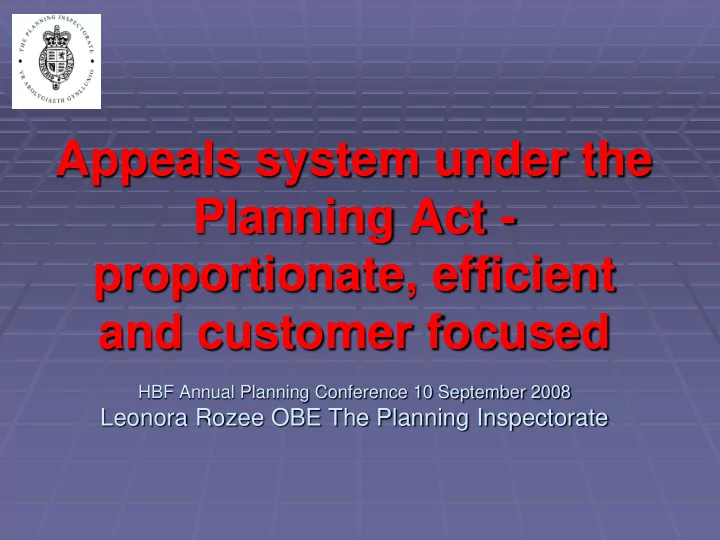

Appeals system under the Planning Act - proportionate, efficient and customer focused HBF Annual Planning Conference 10 September 2008 Leonora Rozee OBE The Planning Inspectorate
Planning White Paper – appeals improvements An appeals system that: - is more proportionate to the type and complexity of each appeal - has improved customer focus and efficiency at its core - is better resourced
Key measures Determining the procedure * – WRs; H or LI Charging for appeals * Improved procedures/guidance on appeal handling * Subject to Planning Bill
Determining the Procedure Adopting the procedure which is appropriate to the case Applying published criteria Extending costs to WRs Parties to suggest appropriate procedure Professional expertise to inform administrative decisions Inspector discretion to change procedure
What you need to know Nature & content of documents Submission of evidence Introducing new material Fixing of inquiry and hearing dates Statements of common ground Costs
Nature and content of documents Appeals should be complete on submission – ie they include: - the appeal form - all relevant plans and drawings that were the subject of the application - the relevant certificates - design and access statement where required At least 30% of all appeals are incomplete
Submission of evidence Adhere to the timetables set in Rules “No surprises” – it is not about wrong footing the opposition Evidence should be focused, relevant, necessary and as concise as possible (aim for max 3000 words) – shared core documents Make proper use of the Costs regime to regulate behaviour
Introducing new material Appeal should be last resort Minor changes or revised proposals - “Wheatcroft principles” LPA has right to expect fully worked out proposals – not about developers “crystal ball gazing” (Planning Issue 1772) “De novo” role of SoS - “ may deal with the application as if it had been made to him in the first instance.” S79(1)(b) 1990 Act
Fixing dates Circular 5/2000 – 20 week target High rate of rejection (+80%) of first offer date Expectation that appellants are ready when they appeal Aim to offer 2 dates one of which will be fixed (or mutually agreed date) Bespoke timetabling
Statements of Common Ground Introduced in 2000 Rules (C5/2000) Intention to narrow issues Current requirement to submit with evidence but frequently arrive during or at end of LI Aim for SoCG to inform evidence – submit 6 weeks after start of appeal Value of SoCG in identifying areas of disagreement as well as agreement
Costs Extend to Written Representation cases Importance of robust costs process to regulate system Important for parties to use the costs regime effectively Costs do not follow outcome – unreasonable behaviour/unnecessary expense New revised Circular
Householder appeals process • A new way of working – fully electronic – piloted since 2 January 08 • Saves time - aim for decision within 8 weeks • Simpler - using LPA file • Saves resources - LPA does not attend SV • Builds on good practice of LPAs •Realises the Government’s Transformation Agenda • Proportionate process & procedures
HAS Pilot – facts and figures 20.8.08 Total Number of Appeals received to date – 60 Total Number of Appeals decided to date – 28 Appeals decided within 8 weeks - 6 Appeals decided within 12 week target – 22 Decisions missing target – 0 Number of LPAs signed up to the pilot - 23 Householder appeals Making it easier, simpler and quicker
Major planning cases IPC is proposed for major infrastructure projects PINS will continue to deal with major cases under the Planning Acts 2005 MIPs rules provide framework for major planning inquiries – based on team working, concurrent sessions and streamlined processes. These will be used for the first time at the forthcoming Stansted G2 Inquiry.
Contact details Leonora Rozee Deputy Chief Executive and Director of Policy, Quality and Development Plans Room 4/09 Temple Quay House, 2 Market Square, Temple Quay, Bristol BS1 6PN 0117 372 8961 Leonora.rozee@pins.gsi.gov.uk
Recommend
More recommend